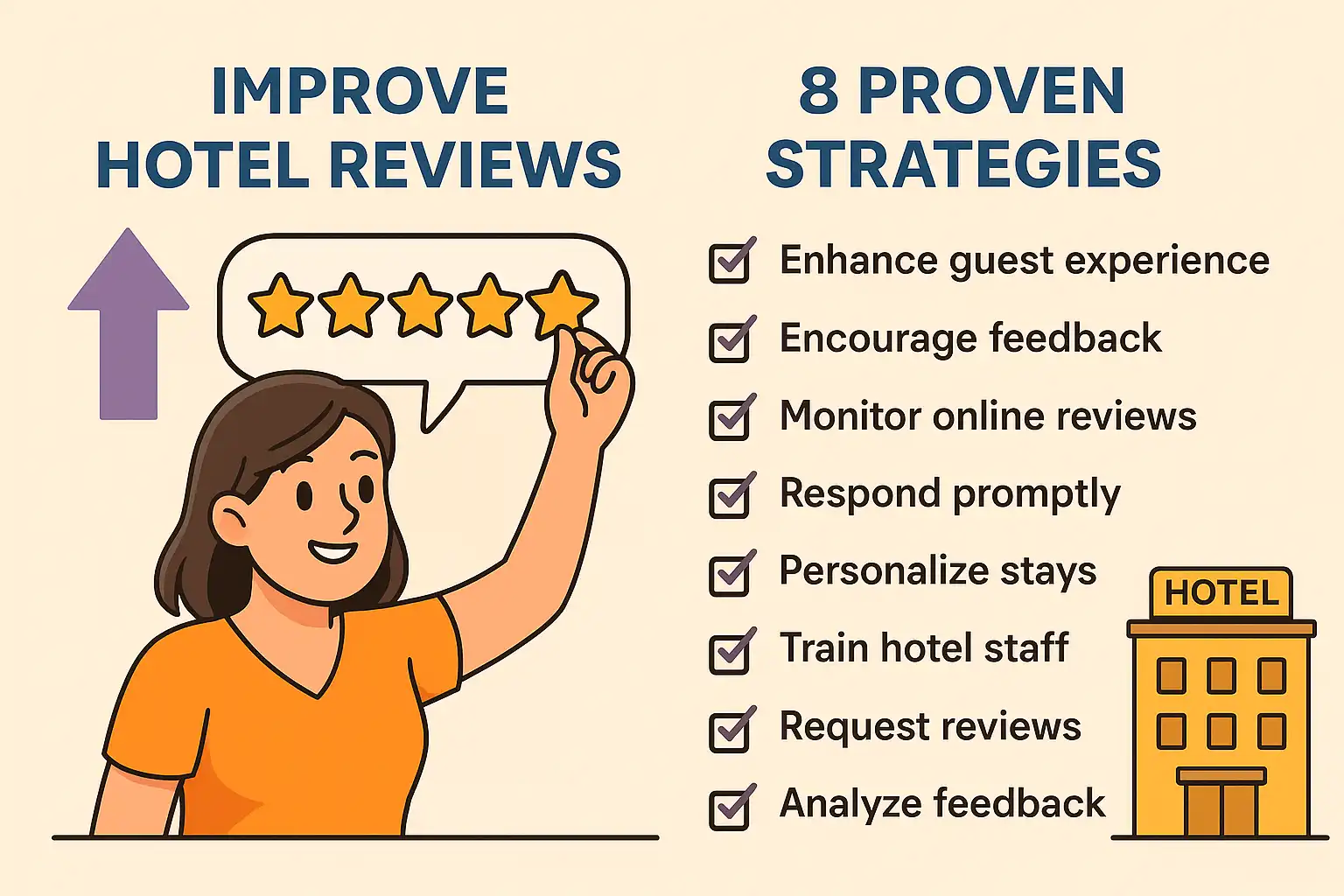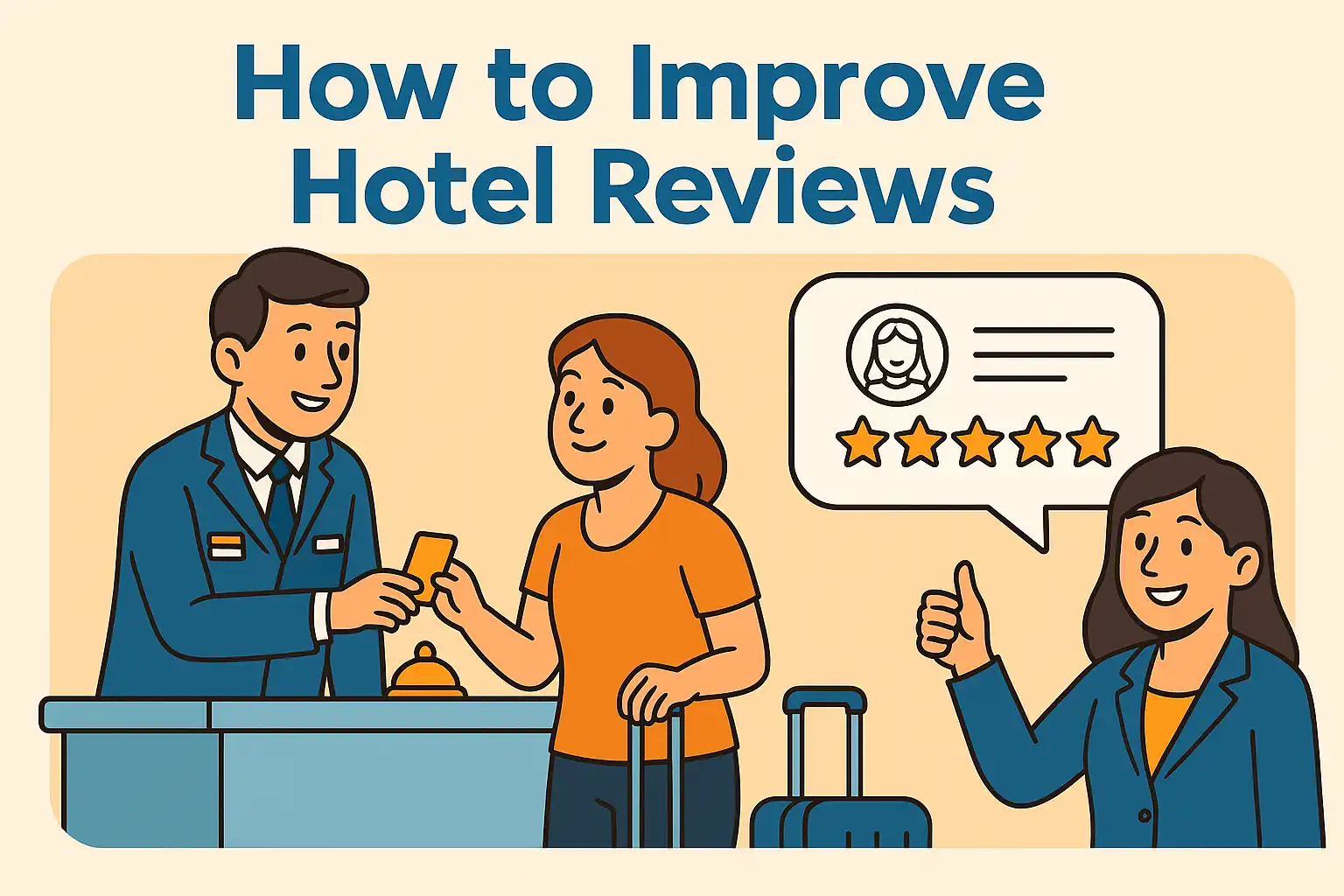Improve Hotel Reviews: 8 Strategies to Boost Online Reputation
 Mika Takahashi
Mika Takahashi Mika Takahashi
Mika TakahashiIn today’s digital world, hotel reviews can truly make or break your business. Did you know that over 93% of travelers check out reviews before booking a hotel? Even more striking, 80% won’t book without reading at least one review. And here’s the kicker: boosting your hotel’s rating from 3.5 to 4.5 stars can increase your revenue by up to 12% and improve occupancy rates just as much.
Guest feedback is about so much more than just star ratings. Positive reviews help drive direct bookings, cut down marketing costs, and give you a competitive edge that traditional ads simply can’t match. On the flip side, hotel negative reviews can cost you thousands in lost revenue and leave a lasting dent in your hotel’s reputation.
With AI-powered booking platforms and meta-search engines increasingly relying on review content to rank hotels, managing your hotel online reputation is more important than ever. In this guide, we’ll walk you through eight proven strategies to improve hotel reviews and give your online reputation a serious boost in 2025.

The way travelers choose hotels has shifted dramatically — it’s all about what other guests say. A whopping 93% of travelers read reviews before booking, making guest reviews the most trusted source of information. And that trust directly impacts bookings: research shows that just a one-star bump in review scores can increase your hotel’s revenue by 5-9% annually.
Platforms like TripAdvisor, Google Reviews, and Booking.com have changed the game. They don’t just display reviews; they analyze review sentiment, freshness, and quality to decide who ranks where. Hotels with consistently positive reviews get better visibility, while those with negative feedback often get buried beyond the first page.
But it’s not just about attracting first-time guests. Happy guests who leave positive reviews become your best marketers — driving repeat business and spreading the word. Studies show guests who leave positive feedback are 60% more likely to book again and refer over three new customers on average.
Your online reputation also affects your relationship with booking platforms. OTAs reward hotels with strong review scores by giving them better placement, lower commission rates, and promotional perks. This creates a positive cycle: good reviews bring more visibility, which leads to more bookings and even more positive feedback.
At the heart of great hotel guest reviews is outstanding service and a good strategy for hotel review management. Guests often highlight three key things in their feedback: cleanliness, friendly staff, and quick service. Hotels that nail these basics tend to get way more positive reviews than those that just focus on fancy amenities or location.
Make sure daily housekeeping checks are thorough, covering everything from obvious surfaces to those often-missed spots like remote controls and light switches. Some hotels even use blacklight inspections and multi-point checks to meet the highest cleanliness standards guests expect.
Train your hotel staff to deliver consistent service that tackles common guest concerns before they become issues. Set clear protocols for frequent guest requests — whether it’s extra towels, restaurant tips, or transportation help. For example, aim for a 15-minute check-in process and empower front desk staff to resolve most guest issues without needing management.
Friendly staff make a huge difference in hotelguest reviews review tone. Encourage your team to connect authentically with guests, remember returning visitors, and proactively solve problems. Give them the authority to offer on-the-spot fixes like room upgrades or complimentary services when things don’t go perfectly.
Don’t forget maintenance! Regularly inspect air conditioning, Wi-Fi, plumbing, and electronics to catch problems before guests do. Many hoteliers say proactive maintenance cuts down negative review mentions by up to 40%.
Getting guests to leave reviews is all about timing and approach. Train your front desk staff to spot those positive moments during a guest’s stay and gently ask for feedback when guests express satisfaction with your services.
The check-in and check-out moments are perfect for planting the seed about reviews. When guests compliment your hotel at checkout, have your staff thank them and casually mention how sharing their experience online helps future travelers find you. This feels more like a friendly chat than a sales pitch.
Use automated email follow-ups sent 24-48 hours after guests leave, when their experience is still fresh but any small frustrations have faded. Include direct links to your top hotel review sites and personalize messages by mentioning something specific about their stay, like the restaurant they visited or amenities they enjoyed.
Place QR codes in guest rooms, lobbies, and restaurants linking straight to review platforms. Pair these with messages explaining how guest feedback helps improve the experience for others. Many hotels see a 25% jump in review volume after adding QR codes.
Consider offering small incentives for honest feedback — loyalty points, a welcome drink voucher for next time, or discounts on hotel services. Just make sure you ask for honest reviews, not just positive ones, to keep things authentic and comply with platform rules.
Post-stay surveys are another smart tool. They catch feedback before it hits public review sites, giving you a chance to fix any issues privately while encouraging happy guests to share their positive experiences online.

Keeping a close eye on reviews and responding quickly can make a big difference to improve hotel reviews and guest satisfaction scores. Set up alerts for new reviews on Google, TripAdvisor, Booking.com, Expedia, and social media. Many hotels use reputation management tools that pull all reviews into one easy dashboard.
Aim to respond to every review within 24 hours, no matter if it’s glowing or critical. This shows prospective guests you genuinely care about feedback and are committed to improving. Research shows hotels that respond to 65% or more of their reviews tend to have ratings 0.15 stars higher on average.
Make your responses personal — thank guests by name, mention specific things they enjoyed, and invite them back. For negative reviews, acknowledge the issue, apologize sincerely, and explain what you’re doing to fix it.
Use your reply as a chance to show off your hotel’s personality and values. Many prospective guests read responses as carefully as the reviews themselves to see how you handle problems and if you truly care.
Create response templates for common issues like noise, Wi-Fi troubles, or housekeeping concerns, but keep them personalized. These should include an acknowledgment, apology, explanation of fixes, and an invitation to continue the conversation.
Train several staff members to handle review responses with a consistent tone and brand voice. This ensures quick replies even if key people are busy and keeps your communication professional.
Technology can be a game changer for improving guest experience — and it naturally opens doors for more positive reviews. Mobile check-in and digital room keys cut down wait times and remove common frustrations that lead to negative feedback.
Today’s guests expect smooth digital experiences from start to finish. Offering in-room tablets or smart TVs lets guests request services, get local tips, and control their room environment without calling the front desk. These systems often prompt guests for feedback at natural moments.
Guest messaging apps allow real-time communication during stays, so your staff can quickly address concerns before they affect the guest experience. Hotels using proactive messaging report up to a 50% drop in negative service mentions and more praise for staff responsiveness.
Use CRM systems to track guest preferences and tailor their experience from before arrival through checkout. Send pre-arrival emails asking about special occasions, dietary needs, or room preferences, then surprise guests by acknowledging these during their stay.
CRM data also helps you offer targeted upsells that boost satisfaction and revenue. For example, spa lovers might get wellness package offers, while business travelers appreciate expedited checkout or meeting room discounts.
Offer personalized local attraction suggestions via your website or app. Guests love insider tips on restaurants and experiences, and often mention these in glowing reviews when it enhances their trip.
Smart room controls for lighting, temperature, and entertainment give guests more comfort and reduce front desk calls. These systems can also gather data to fine-tune settings for future guests.
Contactless payments and digital concierge services smooth out the guest journey and show your commitment to convenience and safety — all factors that shine in positive reviews.
Adding value through thoughtful services creates memorable stays that guests want to rave about. Focus on complimentary perks that exceed expectations without driving up costs — free Wi-Fi, continental breakfast, airport shuttles, and parking remain crowd-pleasers.
Surprise guests with unexpected touches like welcome gifts for special occasions, complimentary upgrades when available, or personalized notes for repeat visitors. These small gestures turn ordinary stays into exceptional experiences worth reviewing.
Partner with local attractions, restaurants, and entertainment venues to offer exclusive discounts or experiences. These partnerships give your staff unique talking points and set your hotel apart from competitors.
Host signature events like wine tastings, seasonal celebrations, cultural performances, or wellness workshops. These create shareable moments that guests frequently mention in positive hotel reviews.
Consider low-cost amenities that meet common needs — charging stations, complimentary bottled water, late-night snacks, or 24-hour fitness access often get disproportionately positive feedback.
Seasonal touches show you care year-round — poolside refreshments in summer, hot chocolate in winter, or warming stations near entrances make a big impression.

Your team’s training directly shapes guest satisfaction and reviews. Develop clear service scripts for common interactions that balance consistency with genuine personality. Role-playing helps staff prepare for everything from routine requests to complaint resolution.
Empower staff to solve guest issues on the spot without always needing management. This might mean offering free services for minor hiccups, room upgrades when available, or restaurant vouchers for delays.
Hold monthly training sessions using real guest feedback and review examples. This helps your team see how their actions impact online reputation and learn from both positive and negative experiences.
Recognize employees who get positive shout-outs in reviews with awards, bonuses, or career growth opportunities. This links excellent service to real rewards and motivates your team to go above and beyond.
Train housekeeping staff to spot and report guest preferences or concerns during room cleaning. This info helps front desk staff personalize service and fix problems before guests complain.
Set customer service standards that go beyond politeness to create memorable moments. Staff should anticipate needs, offer proactive help, and remember returning guests’ details.
Regularly analyzing guest reviews helps you spot trends and track progress. Use sentiment analysis tools to quantify satisfaction and identify recurring themes across all review platforms. Many reputation management systems automate this process.
Track key metrics like Customer Satisfaction Score (CSAT) and Net Promoter Score (NPS) alongside review ratings. These give a fuller picture of how happy guests are and how likely they are to recommend you.
Create quarterly action plans focusing on the top three guest complaints from your review analysis. Prioritize issues that show up across platforms and impact safety, comfort, or satisfaction.
Benchmark yourself against local competitors using review data. This helps you see where you shine and where you can stand out by improving services or amenities.
Keep track of how operational changes affect review sentiment. When you try new policies or upgrades, monitor guest feedback to see what’s working. This data helps justify investments and guides future improvements.
Use these deeper insights to make smart decisions about property upgrades, service offerings, and staff training. Guest data gives you objective direction so you can focus on what really matters.
Gathering feedback at several points during the guest journey helps you catch issues early and encourages positive reviews. Send mid-stay check-in messages via SMS or your app asking if guests need anything or have concerns that staff can address.
Place feedback forms in guest rooms with small perks for completing them — like late checkout or dining discounts. Put these forms where guests naturally spend time, like near coffee stations or on bedside tables, and keep them quick and easy.
Train housekeeping to engage appropriately with guests and report comments or concerns. Housekeepers often interact with guests and can spot both great experiences and potential problems.
Use post-checkout surveys to get detailed feedback before guests post public reviews. This lets you fix issues privately and encourages happy guests to share their positive experiences online.
Collect feedback at natural moments like restaurant visits, spa treatments, or concierge interactions. This captures specific insights while the experience is fresh.
Optimize timing based on guest behavior — mid-stay messages work well on day two of longer stays, and checkout surveys should go out within 12 hours of departure.
Hotels using multiple feedback touchpoints see a 35% boost in review volume and a 20% rise in average ratings within six months. The key is making feedback feel natural and valuable, not a hassle.
Improving hotel reviews takes a thoughtful approach that touches every part of the guest experience. From spotless rooms and friendly staff to smart tech and active feedback requests, these strategies work together to create positive experiences that guests want to share.
The hotels that thrive in 2025 see guest reviews as a vital business asset, not just an afterthought. By putting these eight proven strategies into practice, you’ll boost your online reputation, increase direct bookings, cut marketing costs, and build a lasting competitive advantage.
Start today, and watch your hotel reviews, guest satisfaction scores, and bottom line improve. Remember, building a strong online reputation is a marathon, not a sprint — consistency and genuine care for your guests will pay off in the long run.